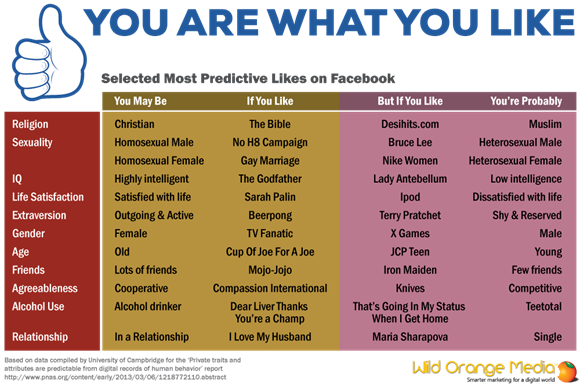If you like the iPod page on Facebook you’re probably more dissatisfied with your life than someone who likes Sarah Palin.
That’s just one of the findings from a new study by researchers at the University of Cambridge that shows how much of our personality we share through our Facebook Likes, whether we realise it or not.
Using a dataset from almost 60,000 volunteers, researchers have built a statistical model that can predict personal, undisclosed attributes like sexual orientation, ethnicity, intelligence and happiness with unnerving accuracy.
For example, the model can correctly discriminate between homosexual and heterosexual men in 88% of cases. So, without even stating a preference, anyone with access to your Facebook Likes can make predictions about related personality traits and behaviours with a high degree of accuracy.
The researchers have also published a list (open .pdf file) of some of the Likes with the most accurate predictive power, a few of which I’ve summarised below:
Take extreme care when dealing with stereotypes. However, this research shows once again how the information we share openly on the social web can reveal details about us far beyond what we would normally be happy to disclose. And with massive factories now crunching data around the clock, the scope for ‘big data’ analytics of this kind will only grow.
Fascinating, if slightly scary stuff. You can also test the accuracy of the model against your own Facebook Likes at http://www.youarewhatyoulike.com/. But, be warned, by doing so you too will become a small, anonymous part of this great data experiment.
Further reading:
- Paper Abstract: Private traits and attributes are predictable from digital records of human behavior
- Article on The Verge: Facebook likes can reveal private personality traits

